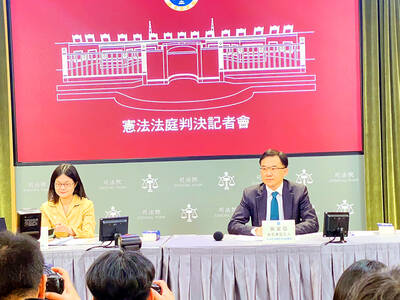NATO leaders were yesterday expected to agree that China presents a security risk, the first time that the traditionally Russia-focused military alliance would have asserted it needs to respond to Beijing’s growing power.
US National Security Adviser Jake Sullivan promised ahead of the meeting in Brussels that US President Joe Biden was attending that China “will feature in the communique in a more robust way than we’ve ever seen before.”
The senior White House official said NATO had a role in developing a shared military capability in response to China, “including in the nuclear sphere,” to engage in information sharing and act as a “forum for democratic values.”

Photo: Reuters
According to a copy of the alliance’s final summit statement seen by Reuters, NATO leaders would say that “China’s stated ambitions and assertive behavior present systemic challenges to the rules-based international order and to areas relevant to alliance security.”
Biden wants to create international blocs of democratic nations to act as a counterweight to China’s authoritarian system and its fast-growing economic and military might, and the topic was also high on the agenda at the weekend’s G7 meeting.
“There is a growing recognition over the last couple years that we have new challenges,” Biden said in brief remarks made shortly after his arrival. “We have Russia, which is acting in a way that is not consistent with what we had hoped, and we have China.”
Other countries have highlighted the importance of striking a balance.
“I think when it comes to China, I don’t think anybody around the table today wants to descend into a new cold war,” British Prime Minister Boris Johnson said as he arrived at the gathering.
NATO Secretary-General Jens Stoltenberg said it was important to engage with Beijing “on issues like climate change, arms control,” but added that “China’s military buildup, growing influence and coercive behavior also pose some challenges to our security.”
G7 leaders criticized Beijing over human rights in its Xinjiang region, called for Hong Kong to keep a high degree of autonomy and demanded a full probe into the origins of COVID-19 in China.
The Chinese embassy in London said that such mentions of Taiwan, Xinjiang and Hong Kong distorted the facts and exposed the “sinister intentions of a few countries such as the United States.”
“China’s internal affairs must not be interfered in, China’s reputation must not be slandered, and China’s interests must not be violated,” it added.
Stoltenberg also said the alliance’s relationship with Russia was at “its lowest point since the end of the Cold War,” blaming Moscow’s “aggressive actions” for the deterioration in relations.
Alliance members were hoping for a strong statement of support for NATO from Biden after several years in which then-US president Donald Trump dominated the summits, threatening to pull out of NATO in 2018 and storming home early in 2019.
“NATO is critically important for US interests in and of itself,” Biden said as he met Stoltenberg, describing NATO’s Article 5, under which an armed attack against one member is deemed an attack against them all, as “a sacred obligation.”
“I want NATO to know America is there,” he added.

TRAGEDY STRIKES TAIPEI: The suspect died after falling off a building after he threw smoke grenades into Taipei Main Station and went on a killing spree in Zhongshan A 27-year-old suspect allegedly threw smoke grenades in Taipei Main Station and then proceeded to Zhongshan MRT Station in a random killing spree that resulted in the death of the suspect and two other civilians, and seven injured, including one in critical condition, as of press time last night. The suspect, identified as a man surnamed Chang Wen (張文), allegedly began the attack at Taipei Main Station, the Taipei Fire Department said, adding that it received a report at 5:24pm that smoke grenades had been thrown in the station. One man in his 50s was rushed to hospital after a cardiac arrest

PUBLIC SAFETY: The premier said that security would be tightened in transport hubs, while President Lai commended the public for their bravery The government is to deploy more police, including rapid response units, in crowded public areas to ensure a swift response to any threats, President William Lai (賴清德) said yesterday after a knife attack killed three people and injured 11 in Taipei the previous day. Lai made the remarks following a briefing by the National Police Agency on the progress of the investigation, saying that the attack underscored the importance of cooperation in public security between the central and local governments. The attack unfolded in the early evening on Friday around Taipei Main Station’s M7 exit and later near the Taipei MRT’s Zhongshan

ON ALERT: Taiwan’s partners would issue warnings if China attempted to use Interpol to target Taiwanese, and the global body has mechanisms to prevent it, an official said China has stationed two to four people specializing in Taiwan affairs at its embassies in several democratic countries to monitor and harass Taiwanese, actions that the host nations would not tolerate, National Security Bureau (NSB) Director-General Tsai Ming-yen (蔡明彥) said yesterday. Tsai made the comments at a meeting of the legislature’s Foreign Affairs and National Defense Committee, which asked him and Minister of National Defense Wellington Koo (顧立雄) to report on potential conflicts in the Taiwan Strait and military preparedness. Democratic Progressive Party (DPP) Legislator Michelle Lin (林楚茵) expressed concern that Beijing has posted personnel from China’s Taiwan Affairs Office to its

‘ILLEGAL RULING’: The KMT and the TPP slammed the Constitutional Court judgement, saying it contravened the law and was trying to clear the way for a ‘green dictatorship’ The Constitutional Court yesterday ruled that amendments to the Constitutional Court Procedure Act (憲法訴訟法) passed by the Legislative Yuan last year are unconstitutional, as they contravene due legislative process and separation of powers. The Legislative Yuan on Dec. 20 last year passed amendments stipulating that no fewer than 10 grand justices must take part in deliberations of the Constitutional Court, and at least nine grand justices must agree to declare a law unconstitutional. The Executive Yuan on Jan. 2 requested that lawmakers reconsider the bill, but the Legislative Yuan, under a combined majority of Chinese Nationalist Party (KMT) and Taiwan People’s Party